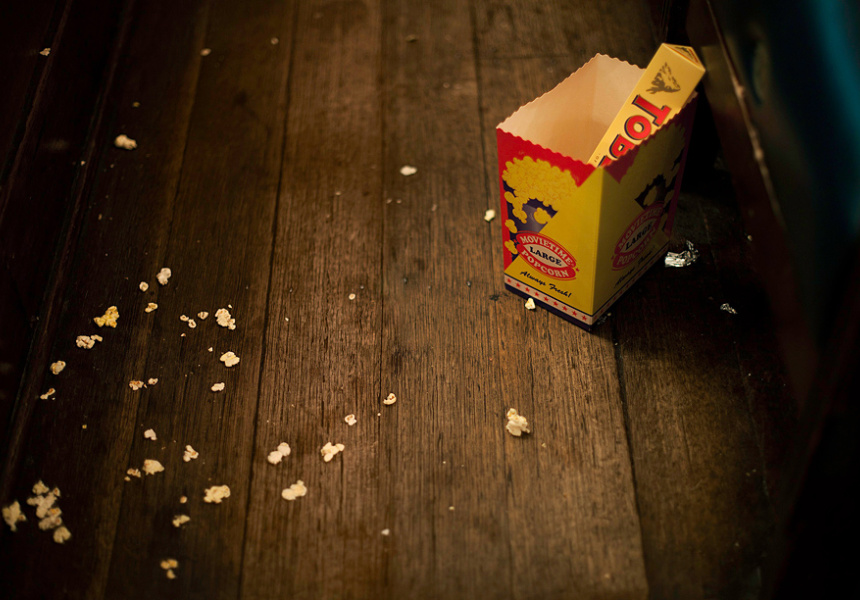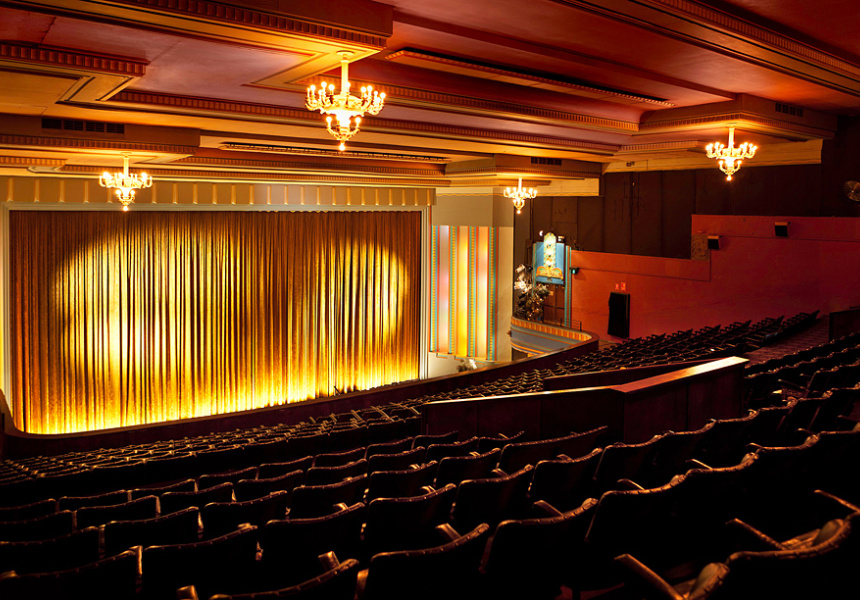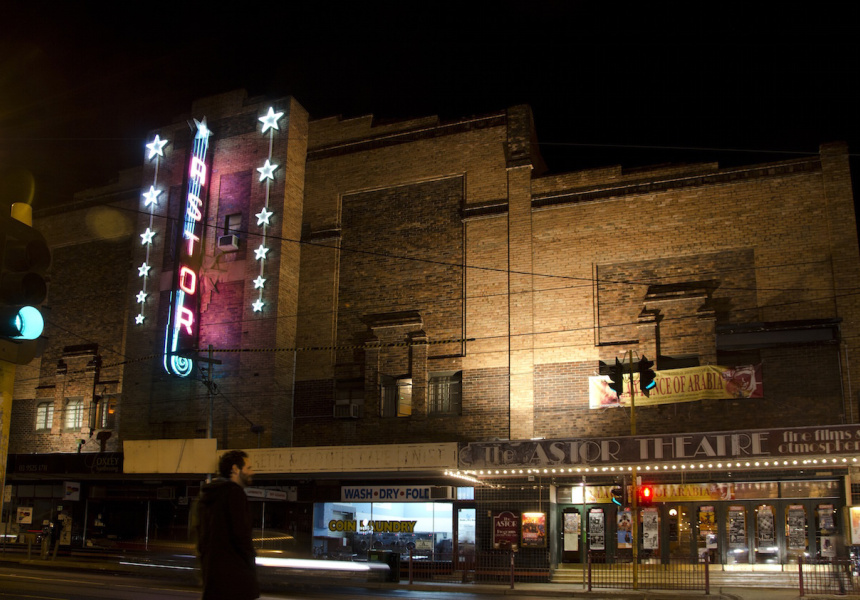There are few buildings in Melbourne that inspire the same level of emotion as The Astor Theatre, the single-screen cinema at the Windsor end of Chapel Street. People love everything about it. The 1936 Art-Deco façade. The 1150 timeworn leather seats. The programming, which celebrates bona fide classics such as Alien, Lawrence of Arabia, and Stanley Kubrick’s 2001: A Space Odyssey.
The Astor is less a business than it is a cultural heirloom, passed down through generations of film buffs.
“The incredible emotional attachment audiences have to the whole experience – not just the films, not just the building – is mind-boggling,” says George Florence, who leased and operated the theatre from 1982 until the start of this month.
We think you might like Access. For $12 a month, join our membership program to stay in the know.
SIGN UPAfter an emotional closing night on April 5, he ceded the space to Palace Cinemas, which has taken over his lease and will resume screenings from June 7. The venue’s owner, Ralamar Nominees, has not changed.
Palace emerged last December as saviour of the historic building and its cinema business, after a disagreement between Ralamar and Florence led to a termination of his tenancy.
It was a sadly ironic twist. In 2007 the site was owned by St Michael’s Grammar, which intended to transform it into a performing arts centre. The school only relented after a very public campaign by Florence and his not-for-profit Friends of the Astor Association (FAA), who together attracted 12,000 signatures on a petition titled Save The Astor.
When businessman Ralph Taranto bought the site a few months later through his company, Ralamar, it seemed as though they’d succeeded. Taranto has owned cinemas for the past two decades and first visited the Astor as an eight year old in the ‘40s. As much as anyone, he wanted to maintain the status quo.
But then things went pear-shaped again. The leasing dispute between Taranto and Florence led to mediation at VCAT, and the end of their long-term relationship. “It was pretty terrible for both of us,” Florence says. “I regret not having a more positive outcome.”
“George was a bit irritated because he wanted some money spent indoors,” says Dale Smith, a representative of Ralamar. “He’s a great cinema operator, but possibly he didn't know there was a building order on the Astor.”
The order, which Ralamar inherited from St Michael’s, meant it was forced to repair the roof and other parts of the building, to the tune of $700,000. The interior aesthetics were the least of its worries. Smith says Florence never understood this, and refused to agree with several standard terms on the lease.
So despite saving the Astor from probable redevelopment by leasing it in 1982, getting it listed with Heritage Victoria in 1999 and overcoming the St Michaels challenge last year, Florence’s long, glorious run came to an end. The man who built the Astor had lost it.
Once again, the theatre’s fate was in the balance. There was a real chance the new tenants wouldn’t want to run a cinema, or that Ralamar would have to sell to a developer.
Installing Palace as the new tenant seemed like a silver bullet – Taranto has been its landlord at Brighton Bay cinemas for the past 20 years. Still, there was justifiable public fear the company would split the cinema into multiple screens, as it did at Westgarth, where one screen became three.
“Different rules apply to the Astor,” says Palace Cinemas’ CEO, Benjamin Zeccola. He insists the company has no intention of dividing the theatre – it doesn’t make sense from a commercial or heritage perspective. “There are plenty of multi-screen cinemas in the area. Dividing it up would only result in the Astor losing its charm. It would lose the thing that makes it special.
“It has an important role to play, not just as a revival cinema or a repertory cinema, but also as an educational institution. It’s a place where school bookings are held. It’s a tourist attraction. It’s a great venue for things such as film festivals, corporate events and weddings. There are a lot of reasons to keep it a single screen.”
Vanda Hamilton, president of the Friends of the Astor Association, agrees. “At this stage it would be absurd to do anything else, because they’ve got the Palace Cinema Como and Village Jam Factory just down the road,” she says. Palace approached her and the FAA prior to signing the lease, keen to secure a blessing and steer clear of another St Michael’s-style backlash.
Thus far it’s in the clear, because its intentions appear to be in the right place. Still, that doesn’t necessarily mean The Astor’s future is totally secure. “Palace has stuck its neck out. This is a big, big gamble for it,” Smith says. “I don't think it’s done a single screen before," he says.
It has, but it might be out of practice. Zeccola’s father, Antonio Zeccola, founded the company at the former Palace Theatre on Bourke Street. Until the late ’70s the company was still showing films on that venue’s single screen and at other single-screen theatres, such as The Metropolitan in Brunswick and The Roma on Bourke Street.
Despite this history, the Astor presents a sizeable challenge. “The projection room is totally unique,” Florence says. “There’s no other room in the world with the same facilities. It’s fully manual, with no automation. That takes a lot of skill to run properly.” Though there’s no full-time role for Florence when the Astor reopens in June, he’s agreed to stay on call for whenever Palace needs technical support.
His company, Chapel Distribution, also owns hundreds of the theatre’s films, which it will lease to Palace at regular rates. For its part, Palace says it plans to make only subtle changes to the rest of the business, such as replacing the theatre’s filter coffee with espresso and getting more involved with film festivals. The latter was always a hard ask for Florence, who didn’t have a network of cinemas behind him with which to tempt festival organisers.
“It’s amazing and inspiring that a physical building has such a high degree of importance for so many people,” Zeccola says. “When we got involved, there was a sense of, ‘We can’t stand around and do nothing while another Melbourne asset is lost, like the Palace on Bourke Street.’”
But for all the commercial responsibility the company is taking on with the lease, Zeccola is acutely aware it has an even trickier task on its hands: managing the emotional baggage attached to the Astor. “There are thousands and thousands of stakeholders who’ll be watching closely and judging harshly,” he says.
Palace Cinemas will release a new program calendar in late May via The Astor Theatre website and its own site. The Astor Theatre will reopen on June 7, with a grand reopening on June 25.
The Astor Theatre
1 Chapel Street, St Kilda



